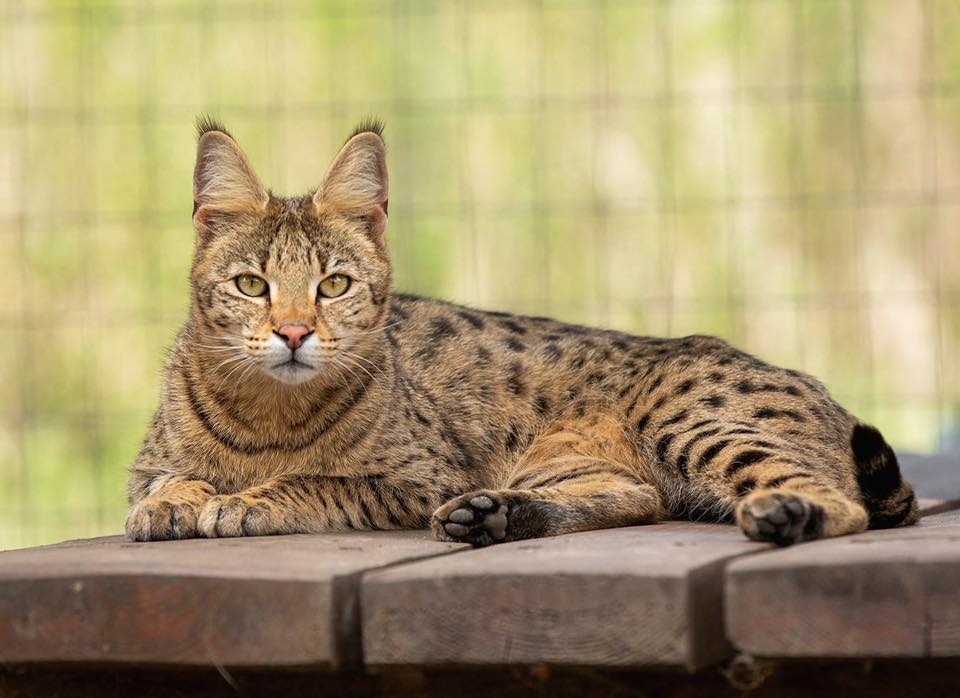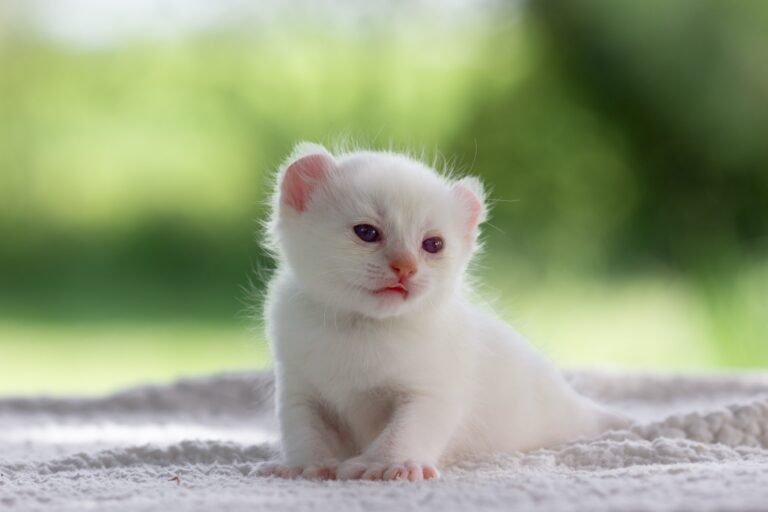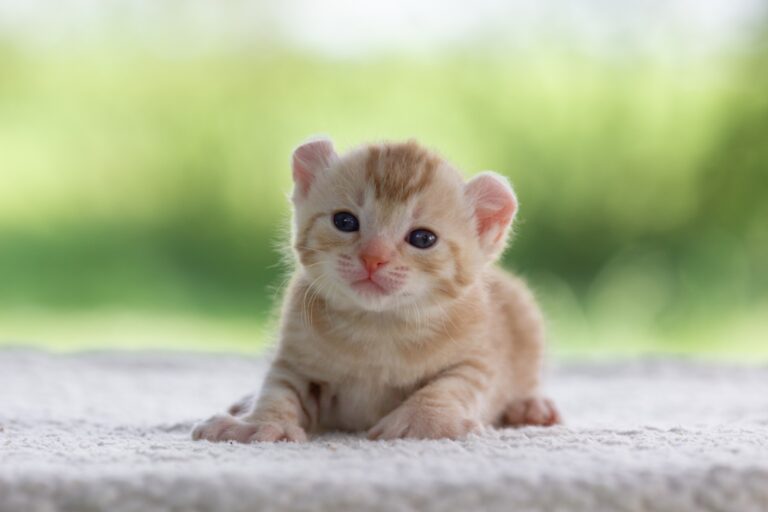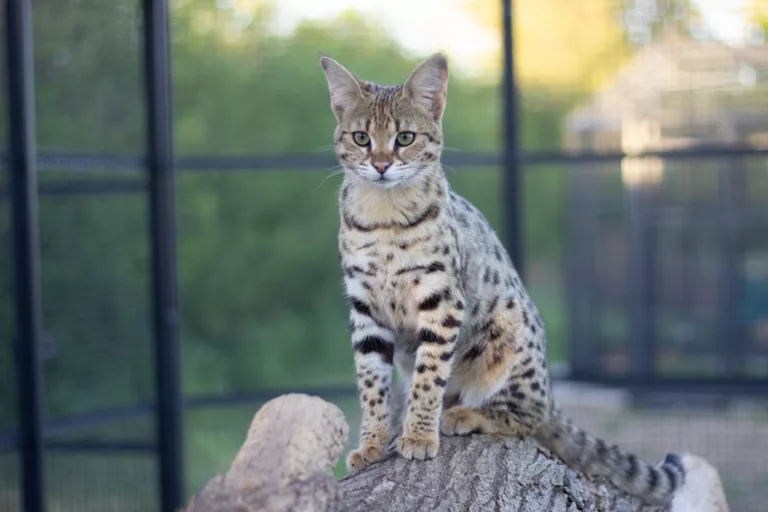Savannah Cats, a fascinating hybrid breed resulting from the crossbreeding of domestic cats with the African wildcat serval, are gaining popularity due to their exotic appearance, lively energy, and captivating personalities. However, their wild ancestry confers certain distinctive physical and behavioral characteristics that require specific care and understanding. In this article, we will delve into these traits, discussing their penchant for climbing and spacious environments, their innate predatory instincts, their cleanliness needs, their solitary tendencies, and the type of toys that suit them best. By understanding the behavior of Savannah Cats and addressing these needs, owners can ensure that their cat remains happy, healthy, and well-mannered. 🐾
Climbing and Space Needs
Savannah Cats, a unique mix of domestic felines and the wild African serval, possess certain distinct physical and behavioral characteristics due to their wild ancestry. Among these, climbing is an essential element of their daily routines. Climbing is intrinsic to Savannah Cats as their ancestors were accustomed to living in trees. African servals would often climb trees to hunt or escape predators. As a result, Savannah Cats inherit a strong desire to climb, jump, and perch at heights.
By providing plenty of climbing opportunities, owners can meet their physical and mental needs. Regular climbing allows Savannah Cats to exercise their muscles, improve their agility, and stimulate their senses. They particularly enjoy ascending and descending tall scratching posts, cat trees, and shelves. Additionally, providing elevated spots such as window sills and perches can help them feel safe and comfortable.
Predatory Instincts
Savannah Cats inherit strong predatory instincts from their serval ancestors, making them skilled hunters in their own right. In their natural habitat, servals are known for their remarkable ability to capture small creatures such as rodents, birds, and insects. Similarly, Savannah Cats demonstrate impressive hunting prowess, using their exceptional speed, agility, and sharp claws to stalk, chase, and capture their prey. Despite their usual prey weighing less than 220 grams, these agile felines can even take on creatures almost their own size, weighing between 4 and 5 kilograms.
Understanding and managing their hunting instincts is crucial to ensuring the safety of other household pets and family members. Early socialization plays a vital role in teaching Savannah Cats to interact peacefully with others. Gradual introductions to new animals, coupled with close monitoring of their behavior, help foster positive relationships. Positive reinforcement-based training methods are effective in establishing desirable behaviors and reducing potential risks related to their hunting instincts.
To provide appropriate outlets for their hunting drive, owners should offer interactive toys that mimic prey. Engaging in play sessions with feather wands or small moving objects satisfies their natural hunting instincts while redirecting their energy in a safe and controlled manner. By providing adequate mental and physical stimulation, owners can effectively satisfy the predatory instincts of Savannah Cats while maintaining a harmonious environment for all.
Litter Training
Litter training a Savannah Cat can be challenging due to their distinctive traits and behaviors. As a hybrid breed with a wild ancestry, Savannah Cats possess a strong instinct to mark their territory, making litter training more complicated compared to other domestic cats.
Here is a step-by-step guide to help you in the litter training process:
Choose the Right Litter
Opt for a large, sturdy litter box that provides enough space for your Savannah Cat to move comfortably and dig. Choose a box with low sides for easy entry, especially for kittens or cats with mobility issues. Consider having an extra litter box if you have multiple cats.
Select the Appropriate Litter
Choose an unscented, non-clumping litter that is gentle on your cat's paws and does not produce strong odors that could deter them from using the litter. Savannah Cats have a sensitive sense of smell, so it's important to use a litter that won't irritate them.
Find the Ideal Location
Place the litter box in a quiet, accessible, and private area of your home. Cats prefer privacy when using the litter, so avoid high-traffic areas or noisy places that might frighten them.
Introduce Your Savannah Cat to the Litter
Gently introduce your cat to the litter by placing them inside shortly after meals or when you notice signs indicating they need to eliminate, such as scratching the floor or showing restlessness. Let them explore the litter and dig in it.
Encourage Positive Associations
Encourage your Savannah Cat to associate the litter with positive experiences. You can do this by offering treats, praise, or gentle caresses immediately after they use the litter correctly. Positive reinforcement helps reinforce the desired behavior.
Maintain a Clean Environment
Keep the litter box clean and free from waste. Scoop the litter at least once a day and remove any soiled litter. Regularly replace the litter and clean the litter box with a mild, unscented soap to avoid odors that could deter your cat from using it again.
React Appropriately to Accidents
If your Savannah Cat has an accident outside the litter box, avoid punishments as they can create negative associations. Quickly and thoroughly clean up the mess using an enzyme-based cleaner to eliminate any lingering scent that could attract them back to the same spot.
Problem-solving
If your Savannah Cat continues to have accidents or avoids using the litter, consider potential reasons such as stress, health issues, or the litter itself. Ensure that the litter is easily accessible, changed regularly, and that there are no underlying health issues. Consult a veterinarian if problems persist.
Remember, patience and consistency are essential when litter training. Each cat learns at their own pace, so be prepared for trial and error. With time and positive reinforcement, your Savannah Cat will understand and adapt to the appropriate use of the litter.
If you have multiple cats, make sure each cat has their own litter box to avoid territorial conflicts. Overall, litter training a Savannah Cat requires patience and consistency. By providing a clean litter box, using positive reinforcement, and promptly addressing accidents, you can successfully train your Savannah Cat to use the litter.
Solitary Nature
Savannah Cats tend to have a solitary lifestyle, especially in the F1 generation. They may not socialize easily with other cats in the household and require a slow and careful introduction process to new feline companions.
It is essential to give the cats enough time to gradually get used to each other's presence. Start with olfactory introductions, where they can familiarize themselves with each other's scents without direct contact. Then, progress to supervised face-to-face interactions, allowing them to establish a sense of comfort and familiarity. This gradual approach helps reduce the risk of conflicts and promotes smooth integration.
In addition to socializing with other cats, owners should prioritize providing a variety of toys and engaging activities to keep their Savannah Cats mentally stimulated. Interactive toys that encourage hunting and stalking behaviors, such as puzzle toys and those that mimic prey, are particularly appreciated. These toys appeal to their natural instincts and provide an outlet for their energy.
To prevent destructive behaviors and alleviate boredom, it is essential to regularly rotate toys and introduce new ones periodically. This keeps the play experience fresh and exciting for Savannah Cats. Investing in climbing structures, shelves, and perches also offers them opportunities for exploration and agility exercise, contributing to their overall well-being.
By understanding and respecting their solitary tendencies while providing engaging activities and toys, owners can ensure that their Savannah Cats lead a fulfilling and enriched life.
Toy Selection
Savannah Cats are an active and intelligent breed, and they need adequate mental and physical stimulation to stay healthy and happy. Therefore, the choice of toys for your Savannah Cat plays a crucial role in entertaining them and allowing them to satisfy their natural instincts.
Savannah Cats prefer toys that stimulate their hunting and stalking instincts. This includes interactive puzzle toys and toys that mimic prey. They also enjoy toys that allow them to climb, jump, and play, such as cat trees, scratching posts, and feather wands.
It is essential to select safe toys for your Savannah Cat. Avoid toys with small detachable parts or those made from harmful materials. To maintain their interest and prevent boredom, regularly rotate your cat's toys.
Dietary Needs
Savannah Cats have slightly different dietary needs from other domestic cats due to their wild serval ancestry. They require a diet rich in quality protein to support their active lifestyle. Commercial cat foods, preferably those specifically formulated for active breeds, can meet these nutritional needs. Some owners also opt for a raw diet, which closely mimics what Savannah Cats would consume in the wild. However, if you decide to feed your Savannah Cat a raw diet, it is crucial to do so under the supervision of a veterinarian to ensure nutritional balance.
Regardless of the chosen diet, it is also essential to maintain a regular meal schedule and appropriate portions to avoid overfeeding and obesity. Remember, treats should be given sparingly and should not exceed more than 10% of their total daily caloric intake.
Socialization and Training
Savannah Cats are known for their intelligence and social nature, traits inherited from their serval ancestry. These cats thrive on human interaction and can be trained to perform various tricks and tasks, much like dogs. They respond well to positive reinforcement-based training techniques, where good behaviors are rewarded with treats or affection.
Here is a socialization method adapted to Savannah Cats, designed for beginners:
Start Early
- Begin the socialization process as early as possible when your Savannah Cat is still a kitten. Young kittens are more receptive to new experiences and can adapt more easily to different environments and interactions.
Safe Space
- Create a safe and comfortable space for your Savannah Cat where they can retreat when they feel overwhelmed or need solitude. Provide them with a cozy bed, toys, and a litter box in this area. This will help them build a sense of trust and confidence, knowing they have a secure place to go when needed.
Progressive Exposure
- Introduce your Savannah Cat to different people, sounds, and environments gradually. Start with calm and familiar individuals, such as family members or close friends, before gradually exposing them to new faces. Ensure these interactions are positive, gentle, and non-threatening.
Treats and Rewards
- Use positive reinforcement techniques to associate social interactions with rewards. Offer treats, praise, or gentle caresses when your Savannah Cat displays calm and relaxed behaviors during socialization sessions. This will help them associate positive experiences with socialization.
Controlled Environment
- Initially, keep socialization sessions in a controlled and calm environment to reduce stress. Introduce new experiences slowly, such as gentle handling, different surfaces to explore, or new sounds. Monitor your cat's reactions and proceed at their pace. If they show signs of fear or discomfort, take a break and reassure them before continuing.
Play and Bond
- Engage in interactive play sessions with your Savannah Cat using toys that encourage hunting and chasing behaviors. This will help strengthen the bond between you and provide positive experiences during play. It also channels their energy and stimulates their natural instincts.
Positive Associations
- Associate positive experiences with new people and environments. For example, invite trusted individuals to offer treats or play with your Savannah Cat. Gradually expose them to different areas of your home and allow them to explore at their own pace.
Patience and Consistency
- Socialization takes time and patience. Be consistent in your efforts but also respect your cat's boundaries. Never force interactions or overwhelm them with too much stimuli at once. Respect their need for personal space and independence.
Remember, each cat is unique, and the socialization process may vary. Observe your Savannah Cat's reactions and adjust your approach accordingly. If you encounter difficulties or concerns, consult a veterinarian or professional animal behaviorist who can provide guidance and support throughout the socialization process.
Territorial Nature
Savannah Cats possess a strong territorial nature, resulting from their wild serval ancestors. As a result, they have a natural instinct to establish and mark their territory, displaying behaviors that indicate ownership and boundaries. A common behavior is marking with pheromones, where Savannah Cats use their scent glands to leave pheromone signals on objects and surfaces, communicating to other animals that the area has been claimed. Additionally, Savannah Cats may rub against furniture or people and scratch surfaces to leave their scent and visually mark their territory.
To address their territorial instincts, owners should provide appropriate outlets for these behaviors. For example, having sturdy and tall scratching posts or cat trees allows Savannah Cats to engage in territorial marking through scratching, preventing them from targeting furniture or walls. Additionally, providing multiple litter boxes strategically placed throughout the house also helps satisfy their territorial needs. It is essential that these litter boxes are easily accessible and kept clean, as a dirty or cluttered litter box can lead to inappropriate elimination behaviors. By creating an environment conducive to the behavior of Savannah Cats and their territorial nature, owners can help their cats feel secure and satisfied in their surroundings.
High Energy and Play
Savannah Cats are known for their high energy levels and playful behavior, which align with their Savannah Cat behavior. Their active nature is a result of their wild heritage, as they inherited traits from their serval ancestors, who are agile hunters in the wild. To keep Savannah Cats physically and mentally stimulated, it is essential to provide them with plenty of opportunities for exercise and play, considering Savannah Cat behavior.
Participating in interactive play sessions is an effective way to channel their energy and satisfy their natural hunting instincts while considering the behavior of Savannah Cats. Toys that mimic prey, such as feather wands or small moving objects, can captivate their attention and encourage them to engage in active play, which is essential for Savannah Cat behavior. Similarly, puzzle toys and treat-dispensing toys provide mental stimulation as Savannah Cats have to solve the puzzle to get their reward, addressing their behavior as Savannah Cats.
Creating an enriching environment for Savannah Cats
Is also essential, considering the behavior of Savannah Cats. This can be achieved by installing climbing structures, shelves, and perches where they can climb, jump, and explore, considering the behavior of Savannah Cats. Introducing new toys and rotating them regularly prevents boredom and keeps their interest, considering the behavior of Savannah Cats. It is important to allocate dedicated playtime each day to ensure they receive the exercise and mental stimulation they need, considering the behavior of Savannah Cats. With their high energy levels and playful nature, Savannah Cats thrive in homes that embrace their active nature and provide means to address their physical and mental needs, considering the behavior of Savannah Cats.
Differences in behavior among Savannah Cats of different generations
The behavior of Savannah Cats can vary depending on the generation to which they belong. First-generation (F1) Savannah Cats, who have one serval parent and one domestic cat parent, tend to exhibit behaviors closer to those of their wild ancestors. They may have higher energy levels, greater independence, and a strong hunting drive. Their behavior may resemble that of their serval ancestors, with a propensity to climb, jump, and explore their environment.
First-generation Savannah Cats may require more space and mental stimulation to satisfy their natural instincts.
Second (F2) and third (F3) generation Savannah Cats, as the generations progress, see the influence of serval ancestry diminish, resulting in slightly more moderate behavioral traits. Second and third-generation Savannahs may strike a balance between their wild instincts and domestic adaptability. They may still possess a good amount of energy and curiosity but can be more adaptable to life in a domestic environment.
These generations often show increased sociability with other pets and family members, making them more suitable for homes seeking a balance between the exotic appearance of a Savannah Cat and a more domesticated behavior.
It is important to note that these are generalities, and individual Savannah Cats may exhibit behavior that does not correspond to these descriptions. Factors such as socialization, environment, and the influence of specific parent cats can also influence a Savannah Cat's behavior, regardless of its generation.
In summary, first-generation (F1) Savannah Cats tend to have higher energy levels and behavioral traits more closely resembling their wild ancestors. Subsequent generations (F2, F3, etc.) exhibit more moderate behavioral traits and increased adaptability to domestic life. However, each Savannah Cat, regardless of its generation, must be evaluated and understood based on its individual personality and the environmental factors that surround it.
Learn more about Savannah Cat generations.
Conclusion
In conclusion, understanding the behavior of the Savannah Cat is essential to provide the appropriate care and environment for this unique hybrid breed. Their wild heritage grants them distinctive traits that require specific attention, such as fulfilling their need to climb, managing their predatory instincts, litter training, and understanding their solitary tendencies. Choosing toys that suit their needs, considering their specific dietary requirements, and providing proper socialization all contribute to ensuring their well-being and fulfillment.
As a Savannah Cat owner, by comprehending and addressing the unique needs of this breed, you can establish a harmonious relationship with your cat and offer them a balanced and fulfilling life. Remember to be patient, consistent, and caring in your approach, and consult with a veterinarian or animal behaviorist if you have any specific questions or concerns.
Savannah Cats offer a unique and rewarding companionship experience, and by providing the right care and environment, you can fully enjoy the company of your cat and provide them with a happy and fulfilled life.



